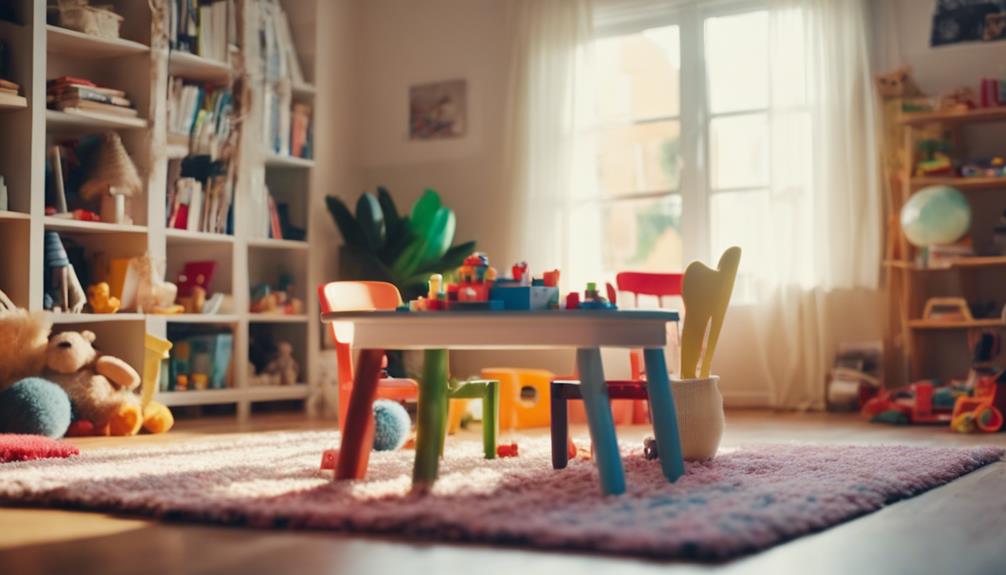Raising children with positivity and growth in mind is essential. It involves setting **achievable yet challenging goals**, promoting good manners, and instilling confidence. Recognize your child’s strengths, promote a **growth mindset**, and teach them to face obstacles with optimism. Foster emotional expression, provide a stable environment with routines, and offer unwavering **parental support**. Delve deeper into parenting guidance to unlock your child’s full potential! Encourage growth and watch your child flourish with your guidance.
Key Takeaways
- Set high yet realistic expectations to motivate children positively.
- Communicate clear and consistent expectations to build their confidence.
- Believing in their abilities fosters self-esteem and a sense of responsibility.
- Encourage accountability and a positive self-image through high expectations.
- Unwavering faith in their potential can enhance their success and performance.
Importance of Realistic Expectations
Why are realistic expectations crucial in parenting?
Unrealistic expectations can often lead to frustration and disappointment for both you and your child. It's important to understand that each child develops at their own pace and has their own unique strengths and weaknesses. Setting unrealistic expectations based on comparisons with other children or unattainable standards can create unnecessary stress and hinder your child's growth.
Building Positive Behavior

To build positive behavior in your children, start by encouraging good manners and setting clear expectations.
By boosting their self-esteem through positive reinforcement, you can nurture a sense of achievement and motivation.
Remember to catch them being good and express unconditional love while disciplining to maintain a strong parent-child bond.
Encouraging Good Manners
Encourage good manners by consistently modeling polite behavior and reinforcing positive interactions with praise and gentle reminders. Teaching children to be polite involves more than just words; it's about demonstrating respect and consideration in your own actions.
Here are some effective ways to instill good manners in your children:
- Model Polite Behavior: Children learn by example, so make sure to use phrases like 'please' and 'thank you' in your daily interactions.
- Offer Praise: When your child displays good manners, praise their effort and behavior to reinforce positive actions.
- Social Interaction: Show children the importance of respect by demonstrating good manners in social situations.
- Role-Playing: Create scenarios where good manners are essential and let your child practice polite behavior in a fun way.
Setting Clear Expectations
Demonstrate clear expectations to your children to promote positive behavior and provide a structured environment for their growth and development. By setting clear and consistent guidelines for behavior and responsibilities, you create a framework that helps your children understand what's expected of them. This clarity reduces confusion, enabling them to succeed and feel accomplished.
Consistency is key in establishing boundaries that provide stability and a sense of security for your children. When expectations are based on age-appropriate capabilities, it sets them up for success and encourages positive behavior. Remember, a supportive environment coupled with clear expectations fosters accountability in your children.
Understanding Child's Capabilities

Recognize that your child has unique strengths and abilities that may differ from other children. By understanding these differences, you can set realistic expectations that match your child's developmental stage.
Encourage a growth mindset by tailoring your support to help your child thrive and reach their full potential.
Child's Unique Strengths
Understanding your child's unique strengths and capabilities is essential for nurturing their potential and fostering a positive parent-child relationship. Each child has their own special talents and abilities waiting to be discovered and appreciated.
Here are some key points to keep in mind when identifying and supporting your child's unique strengths:
- Celebrate Differences: Recognize and celebrate the individuality of your child. Embrace their uniqueness and encourage them to express themselves authentically.
- Encourage Exploration: Provide opportunities for your child to explore different activities and interests. Allow them to experiment and find what they're passionate about.
- Provide Support: Offer encouragement and support as your child discovers their strengths. Be their cheerleader and help them build confidence in their abilities.
- Nurture Growth: Once you identify your child's strengths, nurture them through practice and learning. Help them develop their skills further to reach their full potential.
Setting Realistic Expectations
When it comes to parenting, it's important to set realistic expectations based on your child's capabilities and developmental stage. Understanding that children have limitations based on their age and stage of development is essential.
Recognize that setting unrealistic expectations can lead to frustration and disappointment for both you and your child. Consider factors like attention span, motor skills, and cognitive abilities when setting expectations.
Tailoring your expectations to match your child's individual strengths, weaknesses, and interests is key. By setting realistic expectations, you can promote a positive parent-child relationship and foster a sense of accomplishment in your child.
Remember, children thrive on attention from their parents, so being mindful of what they can realistically achieve won't only benefit them but also strengthen your bond.
Keep in mind that each child is unique, and setting realistic expectations tailored to them will help them grow and succeed.
Encouraging Growth Mindset
To cultivate a growth mindset in your child, start by acknowledging and embracing their current capabilities and limitations. Understanding where your child stands allows you to set realistic expectations and provide appropriate support for their development.
Here are some tips to help encourage a growth mindset:
- Encourage Effort and Perseverance: Emphasize the importance of hard work and dedication in achieving goals.
- Learn from Mistakes: Help your child see errors as opportunities for learning and growth rather than failures.
- View Challenges Positively: Teach your child to approach challenges as chances to improve and develop new skills.
- Focus on Progress: Shift the focus from being perfect to making progress, fostering a positive attitude towards learning and improvement.
Challenging Yet Achievable Goals

Setting important yet achievable goals for your children is essential for their growth and development. Tailoring goals to fit your child's abilities and interests is key to keeping them motivated. By encouraging them to push beyond their comfort zone, you help build resilience and self-confidence.
Finding the right balance between challenge and achievability is vital for teaching perseverance and problem-solving skills. Remember, setting realistic yet challenging goals is a way for you to support your child in reaching their full potential.
Whether it's mastering a new skill, improving grades, or excelling in a hobby, setting these goals can provide direction and purpose. Be there to guide them, celebrate their successes, and help them navigate setbacks. Your belief in their abilities and your support will empower them to aim for greatness.
Keep the momentum going by setting new goals as they achieve the old ones, fostering a culture of continuous growth and achievement.
Providing Support and Guidance

Supporting and guiding your children is key to their growth and development. As a parent, you play an essential role in shaping their future. Here are some ways you can provide support and guidance in their journey:
- Be Present: Show up for your children both physically and emotionally. Listen to them, engage in their activities, and be a steady presence in their lives.
- Set Clear Expectations: Help your children understand what's expected of them while also allowing room for growth and mistakes. Consistent guidance will help them thrive.
- Offer Advice: Share your wisdom and experiences with your children, guiding them towards making informed decisions and learning from your insights.
- Be a Positive Role Model: Demonstrate good behavior, values, and attitudes that you want your children to emulate. Your actions speak louder than words.
Creating Nurturing Environment

To create a nurturing environment for your children, focus on providing safe spaces at home where they feel secure and loved.
Encourage emotional expression by validating their feelings and creating an open atmosphere for communication.
Establish consistent routines to give them stability and a sense of predictability in their daily lives.
Safe Spaces at Home
Designate specific cozy areas in your home where your children can feel safe and comfortable. Creating these safe spaces is crucial for fostering a nurturing environment that promotes their well-being. Here are some tips to help you set up these cozy spots for your children:
- Add Comforting Elements:
Incorporate soft rugs, cushions, and calming colors to create a soothing atmosphere.
- Provide Personal Space:
Guarantee each child has their own designated area where they can have privacy and relax.
- Include Sensory Items:
Introduce sensory items like stuffed animals, blankets, or scented candles to enhance their sense of security.
- Create Relaxation Corners:
Consider setting up a cozy reading nook or a special corner where your children can unwind and de-stress.
Encouraging Emotional Expression
To nurture emotional expression in children, creating a supportive environment where feelings are welcomed and validated is key. Healthy children benefit greatly from being able to express their emotions openly. Here is a simple guide to help you encourage emotional expression in your little ones:
| Encouraging Emotional Expression in Children | ||
|---|---|---|
| Listen actively | Acknowledge their feelings | Teach healthy coping skills |
| Show genuine interest in what they have to say. | Let them know it's okay to feel the way they do. | Encourage them to talk about their emotions. |
| Create a safe space | Model healthy emotional expression | Celebrate emotional growth |
| Make sure they feel comfortable sharing their emotions. | Express your own feelings in a healthy manner. | Praise their efforts in understanding and expressing their emotions. |
Consistent Routines for Stability
Establishing consistent routines in your child's daily life is essential for creating a nurturing environment that fosters stability and security. By implementing regular schedules for activities like bedtime, mealtime, chores, and playtime, you provide a sense of security and predictability that can help reduce your child's anxiety and promote a structured environment where they can thrive.
Here are some key points to bear in mind:
- Security and Predictability: Consistent routines help children feel grounded and secure, knowing what to expect each day.
- Reduced Anxiety: Having a set schedule can alleviate feelings of uncertainty and anxiety in your child's daily life.
- Structured Environment: Children benefit from a structured environment where routines are consistently followed.
- Healthy Habits: Establishing routines early on promotes healthy habits and contributes to a nurturing atmosphere in your home.
Fostering Growth and Development

Encourage children's exploration and curiosity to nurture their growth and development. By providing opportunities for them to learn new skills and develop interests, you can help them thrive. Try to make learning a fun and engaging experience, whether through hands-on activities, educational games, or visits to museums and nature parks. Support your children in setting goals, whether big or small, and help them work towards achieving these objectives step by step. Offering guidance and positive reinforcement along the way will build their confidence and self-esteem.
Create a nurturing environment at home that promotes creativity, problem-solving, and resilience. Encourage your children to express themselves through art, music, or storytelling. Teach them to face challenges with a positive attitude and to learn from setbacks.
Expecting the Best From Children

By establishing high but realistic expectations for your children, you can motivate them to aim for excellence. It's crucial to take time to communicate these expectations clearly and consistently.
When you believe in your children's abilities and set the bar high, it helps them develop a positive self-image and the confidence to tackle challenges head-on. This mindset fosters a sense of responsibility and accountability in children, encouraging them to take ownership of their actions and decisions.
High expectations also push children to work hard, persevere through difficulties, and ultimately achieve their goals. Remember, your unwavering belief in their potential can greatly impact their academic performance and overall success.
Setting Clear and Consistent Goals

Clearly defined goals are essential for guiding your children's progress and fostering their development. When you set clear and consistent goals for your child, they're likely to understand what's expected of them and work towards achieving those objectives. Consistency in goal-setting provides a stable framework for your child's growth, offering them structure and direction as they navigate through different tasks and challenges.
By establishing achievable goals, you can boost your child's confidence and motivation, motivating them to succeed and build a sense of accomplishment.
Remember to create SMART goals for your child – specific, measurable, attainable, relevant, and time-bound. These types of goals are effective in guiding your child's progress, keeping them focused and on track. Regularly reviewing and adjusting these goals ensures they remain challenging and relevant, providing your child with ongoing opportunities for growth and development.
Thriving Through Parental Support

For children to thrive and reach their full potential, parental support plays an essential role in providing consistent love, attention, and guidance. Here are some key ways parental support can help your child flourish:
- Nurturing Environment: Creating a nurturing and supportive environment at home can greatly boost your child's self-esteem and overall well-being.
- Academic Performance: Active parental involvement in your child's academic life can lead to improved performance in school and better emotional development.
- Strong Bonds: Building strong bonds with your child through support and understanding can positively impact their growth and success in various aspects of life.
- Emotional Development: By offering consistent love and guidance, parents can help children develop emotionally, leading to well-adjusted and resilient individuals.
Conclusion
To sum up, by setting realistic expectations, providing support, and fostering growth, you can expect the best from your children.
Remember, every child is unique and capable of achieving great things with your guidance.
So, why not empower them to reach their full potential and watch them thrive?
Take the time to invest in their development and watch them soar to new heights.
Your positive influence can make all the difference in their journey towards success.









